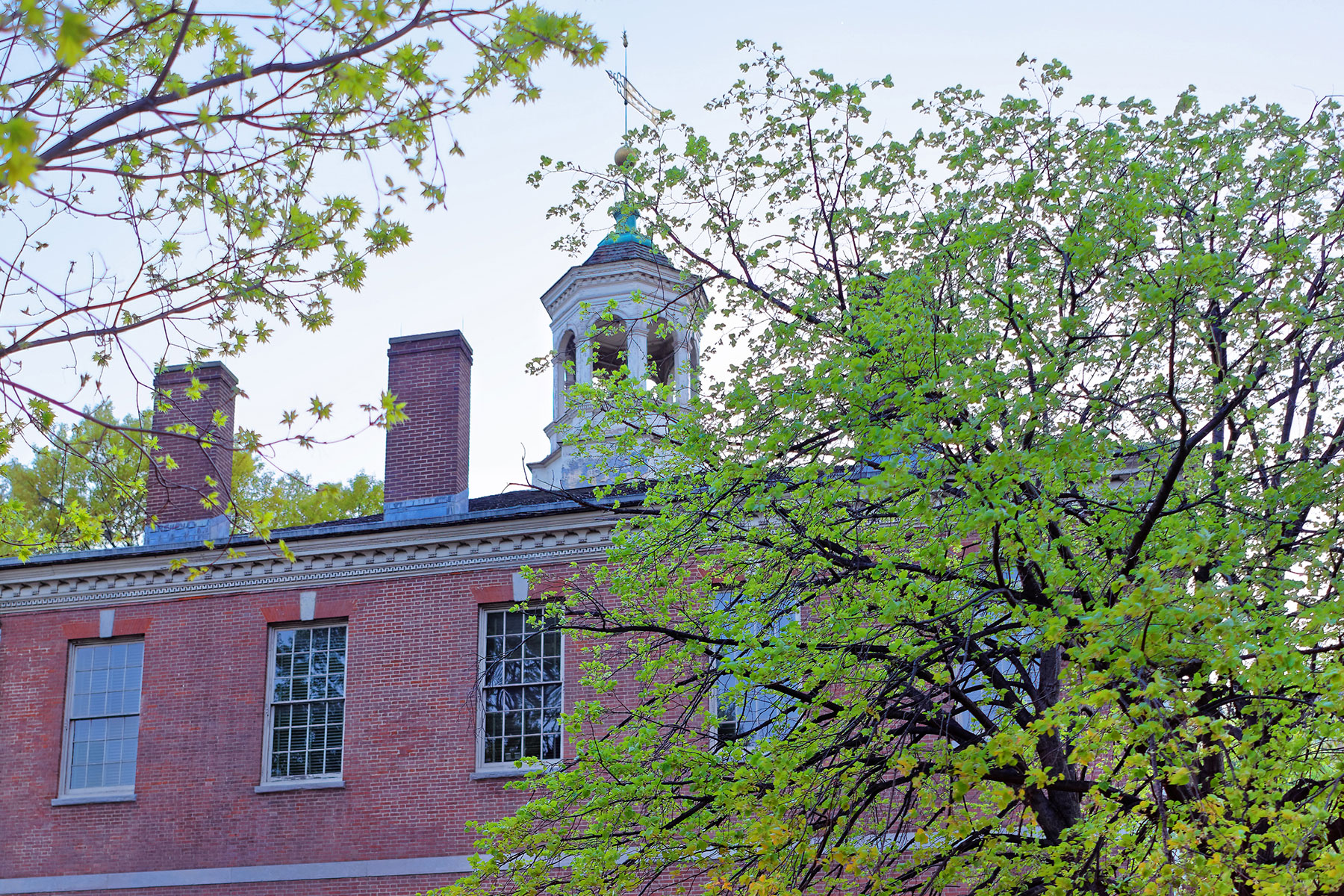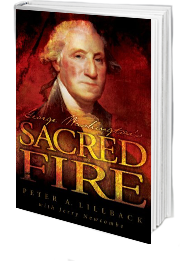The First Continental Congress
Have you ever wondered why Congress opens its sessions in prayer? The reason is traceable to the Pilgrims’ faith in providence which was continued by the men that gathered a century and a half later at the first Continental Congress in 1774.
The history of the first prayer in Congress reveals our founding Patriots’ commitment to divine providence, the integration point of faith and government.
Prayer: The First Act of Congress
America’s first step toward independence began in Philadelphia in Carpenter’s Hall. The Congress’ first official act was to open in prayer. This was not a simple decision, however, and engendered great debate. It was finally agreed that the first man to pray on behalf of the Congress would be Dr. Jacob Duche. His prayer in Carpenter’s Hall, Philadelphia given at the first meeting of the First Continental Congress in September, 1774 says,
Our Lord, our Heavenly Father, high and mighty King of Kings, Lord of Lords, who dost from thy throne behold all the dwellers upon the earth, and reignest with power supreme and uncontrolled over all kingdoms, empires, and governments, look down in mercy, we beseech thee, upon these American States who have fled to Thee from the rod of the Oppressor, and thrown themselves upon Thy gracious protection, desiring to be henceforth dependent only upon Thee.
To Thee have they appealed for the righteousness of their cause. To Thee do they now look up for that countenance and support which Thou alone canst give. Take them, therefore, Heavenly Father, under Thy nurturing care. Give them wisdom in council and valor in the field. Defeat the malicious design of our cruel adversaries. Convince them of the unrighteousness of their cause, and if they still persist in their sanguinary purpose, O let the voice of Thine own unerring justice, sounding in their hearts, constrain them to drop their weapons of war from their unnerved hands in the day of battle. Be Thou present, O Lord of Wisdom, and direct the Council of the honorable Assembly. Enable them to settle things upon the best and surest foundation, that the scene of blood may speedily be closed; that order, harmony, and peace may effectually be restored, and truth and justice, religion and piety, prevail and flourish amongst Thy people.
Preserve the health of their bodies, the vigor of their minds. Shower down upon them, and the millions they here represent, such temporal blessings as Thou seeist expedient for them in this world and crown them with everlasting glory in the world to come. All this we ask in the name and through the merits of Jesus Christ, Thy Son, our Savior. Amen.

Carpenter’s Hall in Philadelphia
In 1875, the Library of Congress produced a placard that summarized various reports from the founders on the impact that this first prayer had on the Continental Congress. It reads,
Washington was kneeling there, and Henry, Randolph, Rutledge, Lee, and Jay, and by their side there stood, bowed in reverence, the Puritan Patriots of New England, who at that moment had reason to believe that an armed soldiery was wasting their humble households. It was believed that Boston had been bombarded and destroyed…They prayed fervently ‘for America, for Congress, for the Province of Massachusetts Bay, and especially for the town of Boston,’ and who can realize the emotion with which they turned imploringly to Heaven for Divine interposition and—‘It was enough’ says Mr. Adams, ‘to melt a heart of stone. I saw the tears gush into the eyes of the old, grave, Pacific Quakers of Philadelphia.
As the Continental Congress was considering their grievances with England, the idea of independence began to be entertained. From Massachusetts came the cry to be free from the “power” and “vengeance” of Great Britain, “which of old persecuted, scourged, and excited our fugitive parents from their native shore, [and] now pursues us their guiltless children with unrelenting severity.” The Congress heard and affirmed the resolve from this colony THAT,
… it is an indispensable duty which we owe to God, our country, ourselves and posterity, by all lawful ways and means in our power to maintain, defend and preserve these civil and religious rights and liberties for which many of our fathers fought, bled and died, and to hand them down entire to future generations.
On Tuesday, October 18, 1774 the Congress resumed consideration of The Plan of Association, which sought the way that the distinct colonies should organize themselves into a united body. In so doing, they reflected the religious character of the new world.
Patrick Henry: Revolutionary from Virginia
Patrick Henry’s famous line, “Give me liberty, or give me death” is rarely given in its context. When that context is read, it is clear that Henry, like the other founders, had a deeply patriotic trust in divine providence. Henry spoke his immortal words in Richmond, Virginia on March 23, 1775. His stirring declaration reveals the Founders’ firm confidence in God’s providential care for America:
There is no longer any room for hope. If we wish to be free…we must fight! -I repeat it, sir, we must fight! An appeal to arms and to the God of Hosts is all that is left us!…Three millions of people, armed in the holy cause of liberty…are invincible by any force which our enemy can send against us. Besides sir, we shall not fight our battles alone. There is a just God who presides over the destinies of nations; and He will raise up friends to fight our battles for us. The battle sir, is not to the strong alone; it is to the vigilant, the active, the brave. . . There is no retreat but in submission and slavery!…Gentlemen may cry, Peace! peace! -but there is no peace…Is life so dear, and peace so sweet, as to be purchased at the price of chains and slavery? Forbid it, Almighty God! I know not what course others may take; but as for me, give me liberty or give me death!
Days of Prayer & Fasting
The importance of divine providence was proclaimed to the new nation by the Continental Congress in its repeated calls for days of prayer and fasting. In March 1776, for example, the Congress declared:
It becomes the indispensable duty of these hitherto free and happy colonies, with true penitence of heart, and the most reverent devotion, publickly to acknowledge the over ruling providence of God; to confess and deplore our offences against him; and to supplicate his interposition for averting the threatened danger, and prospering our strenuous efforts in the cause of freedom, virtue, and posterity….Do earnestly recommend, that Friday, the Seventeenth day of May next, be observed by the said colonies as a day of humiliation, fasting, and prayer; that we may, with united hearts, confess and bewail our manifold sins and transgressions, and, by a sincere repentance and amendment of life, appease his righteous displeasure, and through the merits and mediation of Jesus Christ, obtain his pardon and forgiveness….That he would be graciously pleased to bless all his people in these colonies with health and plenty, and grant that a spirit of incorruptible patriotism, and of pure undefiled religion, may universally prevail; and this continent be speedily restored to the blessings of peace and liberty, and enabled to transmit them inviolate to the latest posterity. And it is recommended to Christians of all denominations, to assemble for public worship, and abstain from servile labour on the said day.
Days of Thanksgiving
The Congress also called for a day of thanksgiving on October 18, 1780 in the wake of the failed plot by Benedict Arnold to betray the American cause into the hands of the British:
Whereas it hath pleased Almighty God, the Father of all mercies amidst the vicissitudes and calamities of war, to bestow blessings on the people of these states, which call for their devout and thankful acknowledgements, more especially in the late remarkable interposition of his watchful providence in the rescuing the person of our Commander-in-Chief and the army from imminent dangers, at the moment when treason was ripened for execution. . . . It is therefore recommended to the several states. . . a day of public thanksgiving and prayer, that all the people may assemble on that day to celebrate the praises of our Divine Benefactor; to confess our unworthiness of the least of his favours, and to offer our fervent supplications to the God of all grace . . . to cause the knowledge of Christianity to spread over all the earth.
Many other examples of the founders’ trust in God can be discovered in their Thanksgiving and Prayer and Fasting Proclamations preserved in the records of the Journals of the Continental Congress.
The Peace Treaty With Great Britain
When peace was finally won with Great Britain at the end of the Revolutionary War, the Treaty signed by the Continental Congress in 1783 affirmed the role of Providence in bringing hostility to an end:
In the name of the Most Holy and Undivided Trinity. It having pleased the Divine Providence to dispose the hearts of the most serene and most potent Prince George the Third, by the Grace of God, King of Great Britain. . . .and of the United States of America, to forget all past misunderstandings and differences. . .
Great Britain had an established Church, but The United States of America did not. Both, however, recognized that the rule of Divine Providence was the transcendent point where faith and government necessarily connected.
